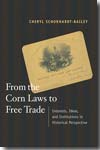From the corn laws to free trade
interests, ideas, and institutions in historical perspective
- ISBN: 9780262195430
- Editorial: The MIT Press
- Fecha de la edición: 2006
- Lugar de la edición: New York. Estados Unidos de Norteamérica
- Encuadernación: Cartoné
- Medidas: 24 cm
- Nº Pág.: 420
- Idiomas: Inglés

The overlapping and interacting forces that caused a Conservative government to repeal the protectionist Corn Laws against its own political principles and economic interests: extensive qualitative and quantitative analysis. The repeal of Britain's Corn Laws in 1846 - one of the most important economic policy decisions of the nineteenth century - has long intrigued and puzzled political scientists, historians, and economists. Why would a Conservative prime minister act against his own party's interests? The Conservatives entered government in 1841 with a strong commitment to protecting agriculture; five years later, the Conservative Prime Minister Sir Robert Peel presided over repeal of the protectionist Corn Laws, violating party principles and undercutting the economic interests of the land-owning aristocracy. Only a third of Conservative members of Parliament supported the repeal legislation and within a month of repeal, Peel's government fell. The Conservatives remained out of power for decades. In this definitive book, Cheryl Schonhardt-Bailey examines the interacting forces that brought about the abrupt beginning of Britain's free-trade empire. Using a wide variety of methodological tools to measure both qualitative and quantitative data (including computer-assisted content analysis of thousands of pages of parliamentary debates), Schonhardt-Bailey concludes that economic interests provided the momentum behind repeal, a momentum that overshadowed almost all else. Indeed, as part of a broader momentum of democratic reform, these same interests, left unsatisfied, may easily have snowballed into revolution - as Sir Robert Peel and others feared. But interests alone did not explain why reform rather than revolution emerged in mid-nineteenth century Britain. In order to resolve more fully the long-standing puzzle of repeal, Schonhardt-Bailey traces the overlapping and intertwined forces of interest, ideas, and institutions.






